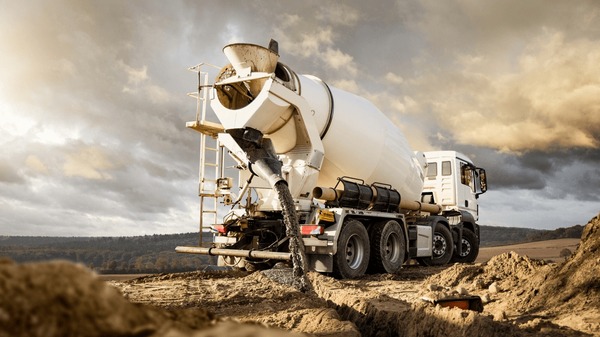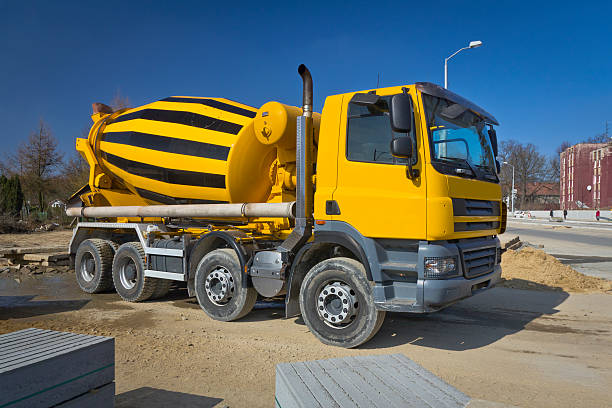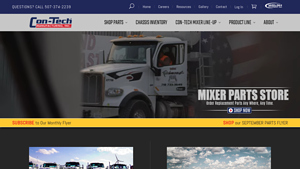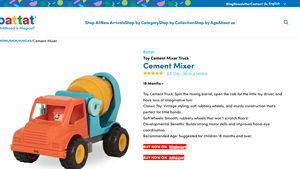Introduction: Navigating the Global Market for cement Mixer Truck
In the dynamic landscape of global construction, sourcing a reliable cement mixer truck can pose significant challenges for international buyers. With the increasing demand for infrastructure development across regions such as Africa, South America, the Middle East, and Europe, the need for efficient and durable mixing solutions has never been greater. This comprehensive guide delves into the diverse types of cement mixer trucks available, their applications in various construction scenarios, and the intricacies of supplier vetting.
Understanding the specifications, features, and pricing of cement mixer trucks is crucial for making informed purchasing decisions. This guide aims to equip B2B buyers with actionable insights, from comparing different models to evaluating the total cost of ownership. By addressing key considerations such as maintenance, fuel efficiency, and local market trends, it empowers stakeholders in countries like Saudi Arabia and Nigeria to navigate their procurement processes with confidence.
With a focus on practical solutions and expert advice, this resource is designed to help you identify the right mixer truck that meets your operational needs while maximizing your investment. Whether you are expanding your fleet or entering the market for the first time, this guide serves as a valuable tool to ensure you make choices that align with your strategic objectives and operational efficiency.
Understanding cement Mixer Truck Types and Variations
| Type Name | Key Distinguishing Features | Primary B2B Applications | Brief Pros & Cons for Buyers |
|---|---|---|---|
| Front Discharge Mixer | Features a front discharge chute, allowing direct pouring. | Urban construction sites, paving projects | Pros: Enhanced control over pouring; Cons: Limited visibility while driving. |
| Rear Discharge Mixer | Traditional design with a rear discharge chute. | Large-scale construction, infrastructure | Pros: Greater capacity; Cons: Requires more space for maneuvering. |
| Volumetric Mixer | Allows for on-site mixing of concrete, adjusting ratios as needed. | Custom concrete mixes, remote sites | Pros: Flexibility in mix design; Cons: Higher initial investment. |
| Agitator Truck | Primarily transports pre-mixed concrete without further mixing. | Long-distance transport of ready-mix | Pros: Efficient for bulk transport; Cons: Limited to pre-mixed options. |
| Mini Mixer Truck | Smaller size, ideal for residential projects and tight spaces. | Small construction, DIY projects | Pros: Maneuverable in confined areas; Cons: Limited capacity. |
What Are the Key Characteristics of Front Discharge Mixers?
Front discharge mixers are designed with a chute at the front, enabling operators to pour concrete directly where needed. This design enhances control during the pouring process, making it suitable for urban construction sites where precision is essential. Buyers should consider factors like the truck’s maneuverability and the operator’s skill level, as these trucks can be more challenging to drive due to their unique layout.
How Do Rear Discharge Mixers Differ in Application?
Rear discharge mixers are the most common type, featuring a chute at the back for pouring concrete. They are ideal for larger projects, such as infrastructure development, where significant quantities of concrete are needed. While they offer higher capacity and are often more economical for large jobs, buyers must account for the space required for maneuvering and the potential need for more extensive driver training.
What Makes Volumetric Mixers Unique for B2B Buyers?
Volumetric mixers are specialized trucks that can mix concrete on-site, allowing for real-time adjustments to the mix ratios. This flexibility is particularly advantageous for projects requiring customized concrete mixes, especially in remote locations. Although they come with a higher upfront cost, the ability to produce fresh concrete on demand can lead to significant savings and reduced waste over time.
Why Choose an Agitator Truck for Long-Distance Transport?
Agitator trucks are designed primarily for transporting pre-mixed concrete. They keep the concrete in a liquid state during transit, making them efficient for long-distance deliveries to job sites. While they are ideal for bulk transport, buyers should note that they are limited to using pre-mixed concrete, which may not suit projects requiring specific mix designs.
What Are the Benefits of Mini Mixer Trucks for Smaller Projects?
Mini mixer trucks are compact and designed for smaller-scale projects, such as residential construction or DIY endeavors. Their smaller size allows them to navigate tight spaces easily, making them a popular choice for urban areas. However, their limited capacity means they may not be suitable for larger projects, so buyers should carefully assess their concrete needs before investing in this type.
Key Industrial Applications of cement Mixer Truck
| Industry/Sector | Specific Application of cement Mixer Truck | Value/Benefit for the Business | Key Sourcing Considerations for this Application |
|---|---|---|---|
| Construction | Transporting ready-mix concrete to job sites | Ensures timely delivery and consistency of mix | Durability, capacity, and compatibility with local regulations |
| Infrastructure Development | Mixing and delivering concrete for road projects | Enhances project efficiency and reduces downtime | Engine power, fuel efficiency, and maintenance support |
| Precast Concrete Production | Supplying concrete for precast elements | Increases production speed and quality control | Mixer technology, batch size, and ease of operation |
| Civil Engineering Projects | Providing concrete for foundations and structures | Supports structural integrity and safety | Load capacity, mixing technology, and regulatory compliance |
| Mining and Quarrying | Mixing concrete for site infrastructure | Improves operational efficiency and safety | Terrain adaptability, mixer size, and reliability |
How is Cement Mixer Truck Used in the Construction Sector?
In the construction industry, cement mixer trucks are pivotal for transporting ready-mix concrete directly to job sites. This application ensures that the concrete maintains its quality and consistency, which is crucial for structural integrity. For international buyers, especially in regions like Africa and the Middle East, sourcing trucks that can handle rough terrain and have a robust build is essential. Additionally, considerations around local regulations regarding emissions and safety standards are vital for compliance and operational efficiency.
What Role Do Cement Mixer Trucks Play in Infrastructure Development?
Cement mixer trucks are extensively used in infrastructure development projects, particularly in road construction. These trucks facilitate the mixing and delivery of concrete, which is critical for laying durable road surfaces. The efficiency of these operations significantly influences project timelines and cost-effectiveness. Buyers must prioritize features such as engine power and fuel efficiency, ensuring that the trucks can operate under demanding conditions while minimizing operational costs.
How Are Cement Mixer Trucks Utilized in Precast Concrete Production?
In precast concrete production, cement mixer trucks supply concrete for creating various precast elements like beams and panels. The ability to mix large quantities of concrete on-site allows for increased production speed and quality control. For businesses in South America and Europe, sourcing trucks equipped with advanced mixing technology can enhance the final product’s quality. Buyers should consider the batch size and the ease of operation to ensure that the mixer trucks align with their production processes.
Why Are Cement Mixer Trucks Important for Civil Engineering Projects?
Civil engineering projects rely heavily on cement mixer trucks for providing concrete for foundations and other structural components. The reliability of these trucks directly impacts the safety and integrity of the structures being built. International buyers, particularly in regions with stringent safety regulations, should focus on trucks that offer high load capacity and advanced mixing technology. This ensures that the concrete meets the required specifications and contributes to the overall project success.
How Do Cement Mixer Trucks Benefit the Mining and Quarrying Industry?
In the mining and quarrying sector, cement mixer trucks are utilized for mixing concrete required for site infrastructure, such as roadways and foundations for equipment. The operational efficiency provided by these trucks can significantly enhance productivity and safety in challenging environments. Buyers should consider the truck’s adaptability to various terrains and its reliability under harsh conditions, ensuring that their investment supports long-term operations effectively.
3 Common User Pain Points for ‘cement Mixer Truck’ & Their Solutions
Scenario 1: Navigating the High Costs of Maintenance and Repairs for Cement Mixer Trucks
The Problem:
B2B buyers in the construction sector often face the daunting challenge of maintaining and repairing cement mixer trucks. With limited budgets and the need for reliable equipment, unexpected breakdowns can lead to significant financial strain and project delays. For instance, a mixer truck that requires immediate repairs can halt concrete delivery, impacting deadlines and client relationships. Additionally, the lack of readily available spare parts, especially in remote locations in Africa or South America, exacerbates this issue, as it can take weeks to source essential components, leading to prolonged downtimes.
The Solution:
To mitigate maintenance costs and reduce downtime, buyers should prioritize investing in high-quality, durable mixer trucks known for reliability. When selecting a truck, consider models with a proven track record for longevity and ease of maintenance. Establish relationships with reputable suppliers who can provide not just the trucks but also after-sales support and access to spare parts. Implement a regular maintenance schedule that includes routine inspections and servicing, which can help identify potential issues before they escalate into costly repairs. Additionally, consider training in-house mechanics or collaborating with local service centers to ensure that maintenance can be performed promptly, thus keeping the mixer truck in optimal working condition.
Scenario 2: Ensuring Compliance with Local Regulations for Cement Mixer Trucks
The Problem:
As B2B buyers expand their operations into different countries, they often encounter varied and complex local regulations concerning vehicle specifications, emissions standards, and operational permits. For example, a construction company operating in Saudi Arabia may find that their cement mixer truck does not meet the stringent emission regulations set by local authorities. This discrepancy can lead to fines, project delays, and even the temporary confiscation of equipment, complicating their ability to fulfill contracts.
The Solution:
To navigate these regulatory challenges effectively, it is crucial for buyers to conduct thorough research on local laws and standards before purchasing or operating a cement mixer truck. Engage with local industry associations or legal consultants who specialize in transportation regulations to stay updated on compliance requirements. When selecting a truck, opt for models that are adaptable and can be easily modified to meet local standards. Additionally, consider investing in telematics systems that monitor emissions and performance, allowing for real-time compliance reporting. This proactive approach not only aids in adherence to regulations but also enhances the company’s reputation as a responsible operator in the construction sector.
Scenario 3: Handling the Logistics of Transporting Cement Mixer Trucks
The Problem:
Transporting cement mixer trucks to job sites, especially in geographically diverse regions such as Africa and the Middle East, presents logistical challenges that can strain resources. Issues such as poor road conditions, traffic regulations, and the weight of the trucks can complicate transportation logistics. For example, a buyer in Nigeria might find that their new mixer truck cannot reach a remote construction site due to impassable roads, resulting in delayed project timelines and increased costs associated with alternative transportation methods.
The Solution:
To address these logistical hurdles, buyers should conduct a comprehensive assessment of the transportation routes and site conditions before finalizing the purchase of a cement mixer truck. Collaborate with local logistics providers who understand the terrain and can offer tailored solutions for transporting heavy equipment. When selecting a mixer truck, consider models designed for versatility and off-road capability, which can better handle varied terrain. Additionally, maintain open communication with project managers to plan delivery schedules that account for potential delays, ensuring that the mixer truck arrives on-site when needed. By incorporating these strategies, buyers can streamline their logistics and enhance overall project efficiency.
Strategic Material Selection Guide for cement Mixer Truck
What Are the Key Materials Used in Cement Mixer Trucks?
Cement mixer trucks are essential for transporting and mixing concrete on construction sites. The selection of materials used in their construction significantly impacts performance, durability, and overall cost. Below is an analysis of four common materials used in cement mixer trucks, focusing on their properties, advantages, disadvantages, and considerations for international buyers.
Steel: The Backbone of Mixer Truck Construction
Key Properties: Steel is renowned for its high tensile strength and durability, making it ideal for structural components. It can withstand significant pressure and is resistant to deformation under heavy loads. Steel’s ability to be welded and fabricated into complex shapes adds to its versatility.
Pros & Cons: Steel is highly durable and can last for many years with proper maintenance. However, it is susceptible to corrosion, especially in humid or saline environments, which may necessitate protective coatings. The manufacturing process can be complex and costly, particularly for high-grade steel.
Impact on Application: Steel is compatible with various media, including concrete and water, making it suitable for mixer drums and chassis. However, its weight can affect fuel efficiency and maneuverability.
Considerations for International Buyers: Buyers in regions like Africa and the Middle East should ensure compliance with local standards (e.g., ASTM, DIN) for steel grades. Corrosion resistance is particularly important in coastal areas.
Aluminum: Lightweight and Corrosion-Resistant
Key Properties: Aluminum is significantly lighter than steel, offering excellent corrosion resistance due to its natural oxide layer. It has good thermal conductivity, which can be beneficial in certain applications.
Pros & Cons: The primary advantage of aluminum is its lightweight nature, which can improve fuel efficiency and payload capacity. However, it is not as strong as steel and may require thicker sections to achieve similar performance, potentially increasing costs.
Impact on Application: Aluminum is suitable for mixer truck bodies and components exposed to the elements. Its corrosion resistance makes it ideal for regions with high humidity or salt exposure.
Considerations for International Buyers: Buyers should consider the cost implications of aluminum, as it may be more expensive than steel. Compliance with international standards for aluminum alloys is also crucial.
Composite Materials: Innovative and Versatile
Key Properties: Composite materials, often a combination of fibers and resins, offer high strength-to-weight ratios and excellent resistance to corrosion and chemical exposure. They can be tailored for specific applications, enhancing performance.
Pros & Cons: Composites can significantly reduce the weight of mixer trucks, improving fuel efficiency. However, they can be more expensive to manufacture and repair compared to traditional materials. The technology for composites may not be as widely available in some regions.
Impact on Application: Composites are particularly effective in components that require high strength but low weight, such as mixer drums and chassis. Their resistance to chemicals makes them suitable for various construction materials.
Considerations for International Buyers: Buyers should evaluate the availability of composite materials in their region and ensure that suppliers meet international standards. Understanding the long-term cost implications of maintenance and repair is also essential.
Rubber: Essential for Mobility and Stability
Key Properties: Rubber is flexible and offers excellent shock absorption and traction. It is resistant to wear and can withstand varying temperatures, making it suitable for tires and seals.
Pros & Cons: Rubber provides superior performance in terms of grip and vibration dampening, enhancing the overall stability of the mixer truck. However, it can degrade over time due to UV exposure and may require regular replacement.
Impact on Application: Rubber is crucial for tires, seals, and hoses in cement mixer trucks. Its properties ensure safe transportation of concrete and other materials.
Considerations for International Buyers: Buyers should consider the availability of quality rubber products in their region, as substandard materials can lead to safety issues. Compliance with international safety standards is also vital.
Summary Table of Material Selection for Cement Mixer Trucks
| Material | Typical Use Case for cement Mixer Truck | Key Advantage | Key Disadvantage/Limitation | Relative Cost (Low/Med/High) |
|---|---|---|---|---|
| Steel | Structural components, mixer drums | High strength and durability | Susceptible to corrosion | Medium |
| Aluminum | Mixer truck bodies, components | Lightweight and corrosion-resistant | Higher cost and lower strength | High |
| Composite | Mixer drums, chassis | High strength-to-weight ratio | Expensive to manufacture and repair | High |
| Rubber | Tires, seals, hoses | Excellent shock absorption and traction | Degrades over time with UV exposure | Medium |
Selecting the right materials for cement mixer trucks is crucial for ensuring performance, durability, and compliance with international standards. By understanding the properties, advantages, and limitations of each material, B2B buyers can make informed decisions that align with their operational needs and regional conditions.
In-depth Look: Manufacturing Processes and Quality Assurance for cement Mixer Truck
What Are the Main Stages in the Manufacturing Process of Cement Mixer Trucks?
The manufacturing of cement mixer trucks involves several key stages, each critical to ensuring the final product meets the rigorous demands of the construction industry. These stages include material preparation, forming, assembly, and finishing.
-
Material Preparation
The process begins with selecting high-quality raw materials, including high-strength steel for the chassis, specialized alloys for the drum, and reliable components for the engine and transmission. Suppliers often conduct rigorous testing on these materials to confirm their mechanical properties. This stage may also involve the procurement of components from various manufacturers, ensuring they meet specific industry standards. -
Forming
During the forming stage, the raw materials are shaped into parts using techniques such as stamping, welding, and machining. For instance, the drum of the mixer is typically formed using rolled steel plates, which are then welded to create a seamless structure. Advanced computer-aided design (CAD) systems are employed to optimize the shape and design, ensuring maximum efficiency in mixing concrete while minimizing weight. -
Assembly
The assembly stage involves integrating various components into the mixer truck. This includes mounting the drum, installing the engine, and connecting hydraulic systems. Automated assembly lines are often utilized to enhance precision and reduce production time. Each assembly line is designed to facilitate quality checks at multiple points, ensuring that every component is correctly fitted and functions as intended. -
Finishing
The final stage includes painting, applying protective coatings, and conducting final inspections. This step not only enhances the aesthetic appeal of the mixer truck but also protects it from environmental factors. Finishing touches might include branding and adding safety features, such as reflective tape and emergency lights.
How Is Quality Assurance Integrated into the Manufacturing of Cement Mixer Trucks?
Quality assurance (QA) is an integral part of the manufacturing process, ensuring that cement mixer trucks meet both international and industry-specific standards.
-
International Standards
Adhering to international standards such as ISO 9001 is critical for manufacturers targeting the global market. ISO 9001 certification demonstrates a company’s commitment to quality management systems and continuous improvement. Additionally, for trucks sold in Europe, CE marking signifies compliance with EU safety, health, and environmental protection standards. -
Industry-Specific Standards
Other relevant certifications may include the American Petroleum Institute (API) standards, particularly for trucks used in oil and gas applications. These standards ensure that the equipment is safe and reliable for use in potentially hazardous environments.
What Are the Key QC Checkpoints in the Manufacturing Process?
Quality control checkpoints are strategically placed throughout the manufacturing process to catch defects early and ensure compliance with quality standards.
-
Incoming Quality Control (IQC)
IQC is the first line of defense, where raw materials and components are inspected upon arrival. This includes verifying the specifications and quality of materials before they enter the production line. -
In-Process Quality Control (IPQC)
During the manufacturing process, IPQC is implemented to monitor ongoing production. This may involve regular sampling and testing of components, as well as visual inspections at various assembly stages to ensure that assembly protocols are being followed. -
Final Quality Control (FQC)
Once assembly is complete, FQC involves a thorough examination of the finished product. This may include functional tests of the mixer drum, hydraulic systems, and overall vehicle performance. Any discrepancies found during this final check can lead to rework or adjustments before delivery.
What Common Testing Methods Are Used to Ensure Quality in Cement Mixer Trucks?
Testing methods play a crucial role in verifying the quality and performance of cement mixer trucks. Common approaches include:
-
Non-Destructive Testing (NDT): Techniques such as ultrasonic testing and magnetic particle inspection are used to identify internal flaws in welds and materials without damaging the components.
-
Load Testing: Trucks are subjected to load tests to ensure they can handle the maximum weight of concrete they are designed to carry. This simulates real-world conditions and identifies potential weaknesses.
-
Functional Testing: Each truck undergoes functional testing of its mixer drum, hydraulic systems, and other critical components to confirm they operate correctly under various conditions.
How Can B2B Buyers Verify Supplier Quality Control Practices?
International B2B buyers must ensure their suppliers maintain rigorous quality control practices. Here are actionable steps to achieve this:
-
Conduct Supplier Audits
Auditing a supplier’s manufacturing facility allows buyers to assess their processes, quality control measures, and adherence to standards in real-time. This can be done through on-site visits or third-party audits. -
Request Quality Assurance Documentation
Suppliers should provide documentation demonstrating their compliance with relevant quality standards, such as ISO certifications, quality manuals, and inspection reports. This documentation should be regularly updated and available for review. -
Engage Third-Party Inspection Services
Utilizing third-party inspection services can provide an unbiased assessment of the supplier’s quality control processes. These firms can conduct inspections at various stages of production and deliver comprehensive reports to buyers.
What Are the Quality Control Nuances for International B2B Buyers?
B2B buyers from regions such as Africa, South America, the Middle East, and Europe should be aware of specific nuances in quality control when sourcing cement mixer trucks:
-
Regional Standards: Different regions may have unique standards and regulations that suppliers must comply with. Buyers should ensure that their suppliers are familiar with local regulations, particularly when exporting equipment.
-
Cultural Considerations: Communication and collaboration may vary based on cultural differences. Building strong relationships with suppliers can foster transparency regarding quality control practices.
-
Logistics and Supply Chain: Understanding the logistics involved in transporting heavy machinery across borders is crucial. Buyers should assess how quality is maintained throughout the supply chain, including handling and storage conditions during transit.
In summary, understanding the manufacturing processes and quality assurance practices for cement mixer trucks is vital for B2B buyers. By focusing on these aspects, buyers can ensure they are investing in high-quality, reliable equipment that meets their operational needs.
Practical Sourcing Guide: A Step-by-Step Checklist for ‘cement Mixer Truck’
Introduction
Navigating the procurement process for a cement mixer truck can be complex, especially for international B2B buyers. This guide provides a structured checklist to simplify your sourcing journey. By following these steps, you can make informed decisions that align with your project requirements and budget, ensuring you choose the right equipment from reputable suppliers.
Step 1: Define Your Technical Specifications
Before initiating your search, clearly outline the technical specifications you need for the cement mixer truck. Consider factors such as drum capacity, engine power, and the type of materials you’ll be mixing.
– Key specifications to consider:
– Drum type (front, rear, or volumetric)
– Maximum load capacity (in cubic meters or yards)
Step 2: Research Market Prices
Understanding market prices for cement mixer trucks is essential for making a sound investment. Research various sources, including online marketplaces and local dealers, to gauge the price range for both new and used trucks.
– Price ranges to note:
– Used trucks can range from $9,000 to $40,000, depending on age and condition.
– New trucks can exceed $250,000, so budget accordingly based on your specifications.
Step 3: Identify Reputable Suppliers
When selecting suppliers, prioritize those with established reputations in the industry. Look for suppliers who have a strong presence in your region and positive reviews from previous customers.
– Where to find suppliers:
– Online marketplaces like IronPlanet and Commercial Truck Trader
– Industry trade shows and exhibitions
Step 4: Evaluate Potential Suppliers
Before committing, it’s crucial to vet suppliers thoroughly. Request company profiles, case studies, and references from buyers in a similar industry or region. Don’t just rely on their website.
– What to verify:
– Supplier certifications (ISO, CE)
– After-sales support and warranty terms
Step 5: Inspect Equipment Condition
For used cement mixer trucks, a thorough inspection is vital. Check for signs of wear and tear, including the condition of the drum, engine performance, and overall truck integrity.
– What to look for during inspection:
– Signs of rust or corrosion
– Functionality of hydraulic systems and chutes
Step 6: Negotiate Terms and Conditions
Once you’ve identified a suitable supplier and inspected the equipment, the next step is to negotiate the purchase terms. This includes price, payment terms, delivery schedules, and warranty provisions.
– Negotiation tips:
– Be clear about your budget constraints.
– Discuss potential maintenance packages as part of the deal.
Step 7: Finalize Purchase and Arrange Logistics
After finalizing the agreement, ensure that all documentation is in order before making the payment. Arrange logistics for delivery, including customs clearance if importing.
– Important documents to secure:
– Bill of sale
– Export/import permits if applicable
By following these steps, B2B buyers can streamline their procurement process for cement mixer trucks, ensuring they make informed decisions that support their operational needs.
Comprehensive Cost and Pricing Analysis for cement Mixer Truck Sourcing
Analyzing the cost structure and pricing for sourcing cement mixer trucks is essential for international B2B buyers, especially in diverse markets like Africa, South America, the Middle East, and Europe. Understanding the cost components and price influencers can help buyers make informed decisions and optimize their procurement strategies.
What Are the Key Cost Components in Cement Mixer Truck Manufacturing?
The manufacturing cost of cement mixer trucks typically comprises several components:
-
Materials: This includes the cost of steel, aluminum, and other materials used in the truck’s chassis and mixer drum. Prices for raw materials can fluctuate based on global market conditions, impacting the overall cost.
-
Labor: Labor costs vary significantly by region. In countries with higher wage standards, labor costs can be a major portion of the manufacturing expense. Conversely, lower-wage regions may offer more competitive labor rates.
-
Manufacturing Overhead: This encompasses the costs related to the factory’s operation, including utilities, maintenance, and administrative expenses. Efficient manufacturing processes can help reduce overhead costs.
-
Tooling: Investment in specialized tools and equipment for production can be substantial. This cost is often amortized over the volume of trucks produced, influencing unit pricing.
-
Quality Control (QC): Ensuring that each truck meets safety and performance standards incurs costs. Effective QC processes can enhance product reliability, which is a selling point for buyers.
-
Logistics: Transportation costs to deliver the mixer trucks to buyers can vary based on distance, shipping methods, and freight rates. Incoterms can influence these logistics costs, affecting the final price.
-
Margin: Manufacturers typically add a profit margin to cover their expenses and provide returns on investment. This margin can vary based on market competition and perceived value.
How Do Price Influencers Affect Cement Mixer Truck Costs?
Several factors can significantly influence the pricing of cement mixer trucks:
-
Volume/MOQ: Purchasing in larger quantities often leads to volume discounts. Buyers should assess their needs carefully to take advantage of these savings.
-
Specifications and Customization: Custom features or specifications can increase costs. Buyers should balance their needs with budget constraints when considering customized options.
-
Materials and Quality Certifications: High-quality materials and certifications can lead to higher prices but often result in better durability and performance, which may justify the investment.
-
Supplier Factors: The reputation and reliability of suppliers can affect pricing. Established suppliers may charge more due to their proven track record, while newer entrants might offer competitive rates to gain market share.
-
Incoterms: Understanding the terms of shipment and delivery can impact total costs. Buyers should negotiate terms that minimize their risk and optimize logistics expenses.
What Are Effective Buyer Tips for Sourcing Cement Mixer Trucks?
-
Negotiate Wisely: Leverage your purchasing power by negotiating terms and prices. Suppliers may be willing to offer better pricing for larger orders or long-term contracts.
-
Focus on Cost-Efficiency: Evaluate the Total Cost of Ownership (TCO), which includes not just the purchase price but also maintenance, fuel efficiency, and resale value. This holistic view can lead to better purchasing decisions.
-
Understand Pricing Nuances: International buyers must be aware of currency fluctuations, import tariffs, and local regulations that can impact final costs. Conduct thorough market research to anticipate these variables.
-
Build Relationships with Suppliers: Establishing a good relationship with suppliers can lead to better service, priority in inventory, and potential discounts on future purchases.
-
Research Local Market Trends: Stay informed about regional market trends and competitor pricing. This knowledge can provide leverage during negotiations and help you secure the best deals.
Conclusion
Navigating the costs and pricing of cement mixer trucks requires a comprehensive understanding of the various components and influencers at play. By focusing on strategic purchasing and maintaining a clear view of total costs, international B2B buyers can optimize their procurement processes and achieve significant savings. It is important to note that prices can vary widely based on location, specifications, and market conditions; thus, buyers should always seek multiple quotes to ensure competitive pricing.
Alternatives Analysis: Comparing cement Mixer Truck With Other Solutions
Understanding Alternatives to Cement Mixer Trucks
In the construction and concrete supply industries, cement mixer trucks are a popular choice for transporting and mixing concrete on-site. However, there are alternative solutions that may suit specific operational needs or budget constraints. This analysis explores these alternatives, allowing B2B buyers to make informed decisions based on performance, cost, and practicality.
Comparison of Cement Mixer Truck with Alternative Solutions
| Comparison Aspect | Cement Mixer Truck | Volumetric Concrete Mixer | Batch Plant with Delivery Trucks |
|---|---|---|---|
| Performance | High capacity, continuous mixing and transport | Adjustable mix designs on-site | Produces large quantities efficiently |
| Cost | Moderate to high (initial investment) | Higher upfront but reduces waste | High initial cost, but cost-effective over time |
| Ease of Implementation | Requires trained operators and infrastructure | Requires training but offers flexibility | Complex setup with significant space requirements |
| Maintenance | Regular maintenance required | Lower maintenance; fewer moving parts | High maintenance; multiple components |
| Best Use Case | Large construction projects needing continuous supply | Projects with varying mix requirements | Large volume projects with consistent demand |
Detailed Breakdown of Alternatives
Volumetric Concrete Mixer
Volumetric concrete mixers are unique in that they allow for on-demand mixing of concrete. This technology enables operators to adjust the concrete mix based on project specifications right at the job site. The primary advantage is flexibility; companies can create different concrete mixes without the need for pre-mixed loads. However, the initial investment can be higher than traditional mixer trucks. Additionally, while they require some operator training, they tend to have fewer mechanical issues due to simpler designs.
Batch Plant with Delivery Trucks
A batch plant setup is designed for larger projects requiring substantial volumes of concrete. This method involves producing concrete in bulk at a centralized location and delivering it via standard concrete trucks. The major benefits include efficiency in production and the ability to meet large-scale project demands. However, the setup costs are significant, and operational logistics can be complex. This option is best suited for ongoing projects where consistent concrete supply is necessary, but it may not be practical for smaller or one-off jobs.
Conclusion: How to Choose the Right Solution for Your Needs
When selecting between a cement mixer truck and its alternatives, B2B buyers should carefully assess their specific project requirements, budget constraints, and operational capabilities. If flexibility and on-demand mixing are crucial, a volumetric concrete mixer may be the best choice. Conversely, for large-scale operations with a consistent demand for concrete, investing in a batch plant and delivery trucks could yield better long-term value. Ultimately, understanding the pros and cons of each option will enable buyers to make informed decisions that align with their business goals.
Essential Technical Properties and Trade Terminology for cement Mixer Truck
What Are the Key Technical Properties of a Cement Mixer Truck?
Cement mixer trucks are essential for transporting and mixing concrete on construction sites. Understanding their technical specifications is crucial for B2B buyers to ensure they make informed purchasing decisions. Here are some critical properties to consider:
-
Capacity (Cubic Yards or Meters)
The capacity of a mixer truck indicates how much concrete it can hold. Common capacities range from 6 to 14 cubic yards (approximately 4.5 to 10.7 cubic meters). Selecting the appropriate capacity is vital for efficiency in large projects, as it impacts the number of trips needed to deliver the required volume of concrete. For large-scale operations, opting for a truck with higher capacity can significantly reduce operational costs. -
Drum Diameter and Length
The drum’s diameter and length affect the mixing efficiency and the quality of the concrete. A larger drum can mix more material, but it also requires more power. Understanding these dimensions helps in evaluating the truck’s performance and suitability for specific types of concrete mixes. A well-designed drum can enhance the homogeneity of the mix, which is crucial for structural integrity. -
Engine Power (Horsepower)
Engine power, typically measured in horsepower (HP), is critical for determining the truck’s operational capabilities. A robust engine ensures that the truck can handle heavy loads and steep inclines. Buyers should consider the terrain and the weight of the materials being transported when evaluating engine specifications. A powerful engine can lead to better fuel efficiency and reduced wear and tear on the vehicle. -
Transmission Type
Mixer trucks can come with automatic or manual transmissions. Automatic transmissions are generally easier to operate and can improve driver comfort, especially in urban settings with frequent stops. On the other hand, manual transmissions may offer better control and fuel efficiency for experienced drivers. Understanding the transmission type can help businesses align their fleet with the skill level of their drivers. -
Chassis Material
The chassis material impacts the durability and weight of the mixer truck. Common materials include steel and aluminum, each with its advantages. Steel offers strength and longevity, while aluminum provides a lighter option that can improve fuel efficiency. Evaluating the chassis material is essential for understanding the truck’s lifespan and maintenance needs. -
Mixing Technology (Front vs. Rear Discharge)
The type of mixing technology affects how the concrete is discharged at the job site. Front discharge mixers allow for precise placement of concrete directly in front of the truck, whereas rear discharge mixers require the truck to back into position. Understanding the differences can help buyers choose the right type based on site conditions and project requirements.
What Are Common Trade Terms Related to Cement Mixer Trucks?
Navigating the purchasing process for cement mixer trucks involves understanding specific industry jargon. Here are some essential terms that buyers should be familiar with:
-
OEM (Original Equipment Manufacturer)
This term refers to the company that manufactures the original components of the truck. When purchasing, it’s crucial to know whether parts are sourced from OEMs for reliability and warranty considerations. -
MOQ (Minimum Order Quantity)
MOQ refers to the minimum number of units a buyer must purchase to qualify for a specific price or terms. Understanding MOQ is essential for budgeting and ensuring that the investment aligns with operational needs. -
RFQ (Request for Quotation)
An RFQ is a formal document sent to suppliers to solicit pricing and terms for specific products. This process helps buyers compare offers and negotiate better deals, ensuring that they secure the best value for their investment. -
Incoterms (International Commercial Terms)
Incoterms define the responsibilities of buyers and sellers regarding shipping, insurance, and tariffs. Familiarity with these terms helps in understanding the costs associated with importing or exporting mixer trucks, particularly in international markets. -
Lead Time
Lead time is the period between placing an order and receiving the product. This term is crucial for project planning, especially in construction, where delays can lead to increased costs. -
Warranty
A warranty is a guarantee provided by the manufacturer regarding the condition and performance of the mixer truck. Knowing the warranty terms is essential for assessing long-term maintenance costs and reliability.
Understanding these technical properties and trade terms will empower B2B buyers to make informed decisions when investing in cement mixer trucks, ultimately enhancing operational efficiency and project success.
Navigating Market Dynamics and Sourcing Trends in the cement Mixer Truck Sector
What Are the Current Market Dynamics and Key Trends in the Cement Mixer Truck Sector?
The global cement mixer truck market is influenced by several key drivers that shape its dynamics. The ongoing urbanization and infrastructure development, particularly in emerging economies like Nigeria, Saudi Arabia, and other regions in Africa and South America, are significant contributors to increased demand for mixer trucks. As construction projects expand, the necessity for efficient concrete transportation solutions becomes paramount. Additionally, technological advancements such as telematics, which enable real-time monitoring of vehicle performance, are becoming increasingly prevalent. This shift not only enhances operational efficiency but also aids in predictive maintenance, reducing downtime and repair costs.
Moreover, the trend towards automated and electric mixer trucks is gaining traction, driven by the growing emphasis on sustainability and reducing carbon footprints. International buyers are increasingly interested in sourcing advanced models that offer better fuel efficiency and lower emissions. This aligns with global efforts to combat climate change, making it essential for B2B buyers to stay informed about innovations and regulations in this area.
Another emerging trend is the growing importance of digital platforms for sourcing. B2B buyers are leveraging online marketplaces and auction sites to access a wider range of mixer trucks, compare prices, and evaluate equipment conditions. This shift towards digital procurement processes is particularly beneficial for international buyers who seek to streamline their sourcing efforts across different markets.
How Is Sustainability and Ethical Sourcing Impacting the Cement Mixer Truck Industry?
The environmental impact of construction activities, including concrete production and transportation, has propelled the importance of sustainability within the cement mixer truck sector. Many manufacturers are now focusing on producing mixer trucks that utilize ‘green’ materials and technologies. This includes sourcing lighter, recyclable materials for truck bodies and incorporating energy-efficient engines to reduce fuel consumption.
Ethical sourcing is also becoming a critical consideration for B2B buyers. Companies are increasingly scrutinizing their supply chains to ensure that materials are sourced responsibly, which includes evaluating suppliers based on their environmental practices and labor conditions. Certifications such as ISO 14001, which focuses on effective environmental management systems, are becoming vital for suppliers to demonstrate their commitment to sustainability.
In addition, buyers are encouraged to consider the lifecycle impact of the equipment they procure. Investing in mixer trucks that are designed for longevity and lower maintenance can significantly reduce waste and resource consumption over time. By prioritizing sustainability in their procurement strategies, B2B buyers can enhance their brand reputation and meet the growing demand for eco-friendly practices in the construction industry.
What Is the Evolution of the Cement Mixer Truck Sector?
The evolution of the cement mixer truck sector reflects broader changes in technology and construction practices. Initially, concrete was mixed on-site, but as construction projects grew in scale and complexity, the need for dedicated mixer trucks became evident. The first dedicated mixer trucks emerged in the early 20th century, paving the way for modern designs that prioritize efficiency and reliability.
Over the decades, advancements in engineering have led to significant improvements in mixer truck design, including the introduction of hydraulic systems for better control and the development of more durable materials. The incorporation of electronic systems for monitoring and diagnostics has further transformed the industry, allowing for smarter, more efficient operations.
Today, as the focus shifts towards sustainability and automation, the cement mixer truck sector continues to evolve. Innovations in electric vehicles and telematics not only enhance operational efficiency but also align with global sustainability goals, ensuring that the industry remains responsive to both market demands and environmental responsibilities.
Frequently Asked Questions (FAQs) for B2B Buyers of cement Mixer Truck
-
How do I choose the right cement mixer truck for my business needs?
Selecting the right cement mixer truck involves assessing your specific requirements, including the volume of concrete you plan to transport and the types of projects you’ll handle. Consider factors like drum capacity, truck size, and the type of discharge (front or rear) that best suits your operational workflow. Additionally, evaluate the truck’s engine specifications, fuel efficiency, and maintenance needs. It’s beneficial to consult with manufacturers or suppliers who can provide insights based on your regional market and project demands. -
What are the essential features to look for in a cement mixer truck?
Key features to consider include drum capacity (typically ranging from 6 to 12 cubic yards), type of transmission (manual vs. automatic), and engine power (measured in horsepower). Look for advanced mixing technology that ensures uniform concrete consistency, as well as durable construction materials that withstand heavy use. Safety features such as proper braking systems, visibility enhancements, and ergonomic cab design are also critical for operational efficiency and driver comfort. -
What are the typical payment terms when sourcing cement mixer trucks internationally?
Payment terms can vary widely based on the supplier and the buyer’s creditworthiness. Common arrangements include a partial upfront deposit (usually 10-30%) with the balance due upon delivery or after inspection. Some suppliers may offer financing options or letters of credit to facilitate large transactions. Always ensure that payment terms are clearly defined in the purchase agreement to avoid misunderstandings and ensure a smooth transaction. -
How do I vet suppliers when purchasing cement mixer trucks?
Supplier vetting involves thorough research to confirm their credibility and reliability. Check for industry certifications, customer reviews, and years of experience in the market. Request references from previous buyers to gauge satisfaction levels. Additionally, assess their after-sales support, warranty policies, and parts availability. Attending industry trade shows or connecting through trusted networks can also provide insights into reputable suppliers. -
What customization options are available for cement mixer trucks?
Many manufacturers offer customization options to meet specific operational needs. This can include variations in drum size, mixer type (volumetric or traditional), and specialized features like enhanced insulation for hot weather or cold-weather adaptations. Custom paint jobs, branding options, and additional equipment such as water tanks or toolboxes can also be tailored to your specifications. Discuss these options with your supplier to align with your project requirements. -
What is the minimum order quantity (MOQ) for cement mixer trucks?
The MOQ for cement mixer trucks often depends on the supplier’s production capacity and your location. Some suppliers may allow single-unit purchases, while others might require a minimum of two or more trucks to fulfill an order. If you’re looking to import, consider the shipping costs and logistics involved, as bulk purchases may offer better pricing and reduce per-unit shipping expenses. -
What are the logistics considerations when importing cement mixer trucks?
Importing cement mixer trucks requires careful planning of logistics, including shipping methods (container vs. roll-on/roll-off), customs clearance procedures, and compliance with local regulations. Ensure you have a reliable freight forwarder who understands the import process for heavy machinery. Additionally, factor in potential tariffs and taxes that may apply upon entry into your country, which can significantly affect the overall cost. -
How can I ensure quality assurance for cement mixer trucks?
To guarantee quality, request detailed specifications and certifications from the supplier, ensuring that the trucks meet industry standards. Conduct pre-shipment inspections to verify the condition and functionality of the trucks before they leave the manufacturer. Establish clear warranty terms and after-sales support to address any potential issues post-purchase. Engaging third-party inspection services can also provide additional assurance of quality and compliance with your specifications.
Important Disclaimer & Terms of Use
⚠️ Important Disclaimer
The information provided in this guide, including content regarding manufacturers, technical specifications, and market analysis, is for informational and educational purposes only. It does not constitute professional procurement advice, financial advice, or legal advice.
While we have made every effort to ensure the accuracy and timeliness of the information, we are not responsible for any errors, omissions, or outdated information. Market conditions, company details, and technical standards are subject to change.
B2B buyers must conduct their own independent and thorough due diligence before making any purchasing decisions. This includes contacting suppliers directly, verifying certifications, requesting samples, and seeking professional consultation. The risk of relying on any information in this guide is borne solely by the reader.
Top 7 Cement Mixer Truck Manufacturers & Suppliers List
1. IronPlanet – Mixer Trucks
Domain: ironplanet.com
Registered: 1999 (26 years)
Introduction: Mixer Trucks for Sale: Buy and sell unused and used Mixer Trucks at IronPlanet. Mixer Trucks can mix various materials, commonly associated with concrete. Available types include Agitor Trucks, Front Discharge Mixer Trucks, Rear Discharge Mixer Trucks, and more. Top manufacturers include International, Mack, Peterbilt, and others. Current inventory includes 343 Mixer Trucks, with 337 standard Mixe…
2. CTM Mixers – High Performance Concrete Mixer Trucks
Domain: ctmmixers.com
Registered: 2008 (17 years)
Introduction: Concrete Mixer Trucks, Con-Tech Mixer Line-Up, BridgeKing® Mixer, Extreme Duty Mixer, Extended Tag Mixer, High Performance Drum, Armor-Tech Wiring Harness, EcoWash Gen II, Elite Control System™
3. Reddit – Concrete Mixing Solutions
Domain: reddit.com
Registered: 2005 (20 years)
Introduction: Old school cement mixer trucks require quick unloading before the concrete sets, while new mix-when-ready trucks minimize excess concrete. Old mixers may dump excess concrete into blocks or onto the ground, which is then recycled. Ready mix plants offer strict quality control for consistent mixes, whereas volumetric mixers depend on operator skill, leading to potential mistakes in batching and wat…
4. Battat – Cement Mixer Toy Truck
Domain: battattoys.com
Registered: 2018 (7 years)
Introduction: {“name”: “Cement Mixer”, “type”: “Toy Cement Mixer Truck”, “brand”: “Battat”, “recommended_age”: “18 months and over”, “sku”: “BT2511”, “dimensions”: “12.00 inch x 5.88 inch x 7.00 inch”, “features”: [“Spin the mixing barrel”, “Open the cab for the little toy driver”, “Vintage styling”, “Soft rubbery wheels that won’t scratch floors”, “Sturdy construction”, “Promotes hands-on play”, “Builds strong…
5. Syntech – Cement Trucks
Domain: syntech.com.sg
Registered: 1999 (26 years)
Introduction: A cement truck, also known as a cement mixer, is a heavy-duty vehicle used in the construction industry to carry ready-mixed concrete to building sites. Key features include:
– Mixing drum with a capacity ranging from 8m3 to 12m3.
– Equipped with two or more axles, commonly four, five, or six, to distribute load evenly.
– Some models feature Hardox technology for low weight, wear resistance, and h…
6. Mixer Trucks – GovPlanet
Domain: govplanet.com
Registered: 2007 (18 years)
Introduction: Mixer Trucks for Sale on GovPlanet. Available brands include International, Mack, Oshkosh, Volvo, and more. Types include Front Discharge and Rear Discharge models. Current inventory includes 258 Mixer Trucks, with options for auction, buy now, and make offer. Popular makes include Ford, Freightliner, International, Kenworth, Mack, Oshkosh, Peterbilt, and Sterling. Models range from 2000 to 2024, …
7. Adobe Stock – Cement Mixer Truck Images
Domain: stock.adobe.com
Registered: 1986 (39 years)
Introduction: Cement Mixer Truck Images – Browse 33,028 Stock Photos, Vectors, and Video | Adobe Stock
Strategic Sourcing Conclusion and Outlook for cement Mixer Truck
In navigating the complex landscape of cement mixer truck procurement, strategic sourcing emerges as a vital approach for international B2B buyers. By understanding the diverse range of available models—from established brands like Mack and Freightliner to innovative options like volumetric mixer trucks—buyers can make informed decisions that align with their operational needs and budget constraints. The market offers a spectrum of choices, from used trucks with proven performance to new models equipped with advanced technology, allowing companies to optimize their fleets effectively.
Moreover, the ability to source mixer trucks from various regions, including Africa, South America, the Middle East, and Europe, enables buyers to tap into competitive pricing and diverse supplier networks. This geographical flexibility not only enhances procurement efficiency but also fosters relationships that can lead to long-term partnerships.
As the demand for cement and concrete continues to rise globally, now is the time for buyers to leverage strategic sourcing. Embrace the opportunities presented by this dynamic market to secure the right mixer trucks for your projects. Engage with trusted suppliers, explore auction platforms, and assess your fleet requirements proactively to stay ahead in this competitive environment. The future of your operations depends on the quality of your equipment—make the right choice today.









